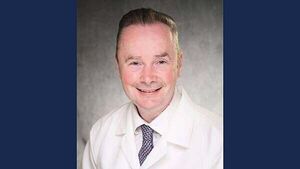The Mayo native who rewrote the rules of life

Conor McGuire
In the flat expanses of Iowa, where cornfields stretch beyond sight and winter winds cut through the heartland with prairie precision, a man from Ballina has been quietly rewriting the very definition of when human life becomes viable.
Dr Patrick J. McNamara, firstborn son of Padraic and Eileen McNamara, Bohernasup, and a distinguished alumnus of St Muredach's College, whose Mayo roots run as deep as the Moy itself, has spent his career pushing against the boundaries of what medical science once deemed impossible.
Last month, his work reached its most extraordinary vindication when a baby boy named Nash Keen entered the Guinness World Records as the most premature surviving infant in human history, born at just 21 weeks and zero days gestational age, a full 133 days ahead of his due date.
To comprehend the magnitude of this achievement, one must first understand the brutal mathematics of premature birth. At 21 weeks, a foetus weighs less than a pound, its skin translucent as tissue paper, lungs barely formed sacs that have never drawn breath.
The medical establishment has long held that survival at this gestational age is simply incompatible with life. Indeed, most hospitals worldwide do not attempt resuscitation of infants born before 22 weeks, considering such efforts not merely futile but potentially cruel.
Yet Nash Keen lived, thrived, and went home to his family in Ankeny, Iowa, after 189 days in hospital, a testament to Dr McNamara's revolutionary approach to neonatal care and his refusal to accept conventional wisdom about the limits of human resilience.

Dr McNamara's path from the familiar waters of the Moy to America's most advanced neonatal units started in the corridors of St Muredach's College, where a young Ballina student first showed the sharp mind and stubborn curiosity that would one day upend medical convention.
He speaks with glowing admiration of his parents.
"The unwavering support of my parents, who were exceptional role models through my childhood and beyond, shaped the person who I am, my beliefs and ideals."
From those Mayo foundations, he would go on to establish himself as one of the world's leading neonatologists, but more significantly, as a pioneer of the field of neonatal hemodynamics in premature infants, a technique that uses ultrasound to assess blood flow and heart function with unprecedented precision.
"We never want the parents to lose hope, but many of them are in an unreal situation, so we have to be very honest with them," Dr McNamara reflected when discussing Nash's case.
Dr McNamara's establishment of the neonatal hemodynamics program at the University of Iowa represents what he describes as "precedent-setting in the United States", serving as a national landmark programme. This is no mere academic hyperbole. This success is years in the making.
UI Health Care Stead Family Children's Hospital has some of the best survival outcomes for babies born at 22 weeks. It was this success that encouraged the organisation to try to resuscitate babies born as early as 21 weeks.
The technique Dr McNamara has championed cuts the risk of death or severe brain bleeding in half for very premature babies.
Where traditional approaches might assume a low blood pressure indicates heart failure and respond with powerful medications, hemodynamic monitoring reveals the subtler truth - sometimes the heart functions perfectly well, and the problem lies elsewhere entirely.
For Nash Keen, this precision proved literally life-saving. When Nash arrived that July, weighing barely ten ounces, his blood pressure had crashed. Standard protocol would have meant hitting the heart hard with powerful drugs.
Dr McNamara's ultrasound monitoring told a different story - the heart was working fine, the trouble lay elsewhere. So they adjusted course accordingly, scalpel-sharp rather than sledgehammer-blunt. That eye for detail, that bloody-minded refusal to follow the cookbook, separates the truly gifted from the merely qualified.
The story of Nash's survival reads like something from the realm of mythology rather than a medical textbook. His parents, Mollie and Randall Keen, had already endured the devastating loss of their daughter McKinley at 18 weeks of gestation.
When Mollie became pregnant again, an incompetent cervix threatened to repeat the tragedy. At 20 weeks, she was already two centimetres dilated - a harbinger of premature labour that sent the couple rushing to Iowa City in the small hours of a Tuesday morning.
What followed was a race against biology itself. The Keen family needed their baby to survive until after midnight on July 5th, 2024, when he would cross the 21-week threshold that would trigger Iowa's unprecedented willingness to attempt resuscitation.
By the narrowest of margins - literally hours - Nash crossed that line, entering the world at a weight less than a can of Coca-Cola, his survival chances officially calculated at zero.
Yet survive he did, through complications that would have felled stronger patients: perforated bowel requiring surgery with a 30-40 per cent mortality rate, chronic pulmonary hypertension, heart defects, and the constant threat of brain bleeding that shadows all extremely premature infants.
Through 189 days of what his mother described as a "constant roller coaster", Nash demonstrated the sort of resilience that seems to transcend mere medical intervention.
The great Irish medical tradition - from the battlefield surgeons who earned their spurs in foreign wars to the researchers who unlocked the mysteries of tropical disease in far-flung colonies - has always been characterised by this combination of technical excellence and bloody-minded persistence.
Dr McNamara embodies this tradition while simultaneously transcending it. His way of working comes down to what he terms "thoughtful clinical decision making" - getting to the heart of why you're doing something rather than just ticking boxes on a chart.
That restless questioning, married to the latest kit, has delivered results his peers call world-beating for babies who arrive far too soon.
The establishment of Iowa's unique hemodynamics fellowship programme - the first of its kind in the United States - ensures that Dr McNamara's innovations will ripple outward, training a new generation of neonatologists to apply these life-saving techniques.
His research has demonstrated not merely that such interventions can work, but that they can work consistently, reproducibly, and with outcomes that challenge everything the medical establishment once believed about the limits of viability.
Nash Keen just had his first birthday party, complete with the kind of belly laughs and huge smiles his parents thought they might never see. He's still catching up developmentally - not quite where full-term babies his age are - and his family watches his progress carefully.
The good news is he didn't have any brain bleeding while he was in the NICU, which gives his doctors confidence about his mental development down the road.
Stanford, a neonatologist and hemodynamics specialist who resuscitated Nash at birth and who follows Nash as an outpatient, has drawn a line in the sand: "By the time he's five years old, when he goes to kindergarten, no one will know that he was born so early."
Dr McNamara is glowing in his tribute to his fellow medics.
"The success of the Iowa team is a testament to the dedication and passion of all members of the interprofessional team. The work at Iowa is becoming the catalyst for other programmes across the world, including Irish hospitals, to reshape their practices and invest in the necessary infrastructure to enhance the outcomes for these vulnerable patients."
Nash's survival means more than one family's happiness. Dr McNamara and his crew have proved that medicine's supposed absolutes bend more easily than anyone thought. Given enough skill, kit, and sheer pig-headedness, you can rewrite the rules about who lives and who doesn't and open doors for other families in the same boat.
From the classrooms of St Muredach's College to the high-tech corridors of Iowa's Stead Family Children's Hospital, Patrick McNamara has travelled a remarkable professional journey.
Yet perhaps his most significant achievement lies not in the accolades or the research publications, but in the simple fact that a little boy from Ankeny will grow up knowing that when the medical establishment said "impossible", an Irishman from Ballina said "not today".
In times when we're constantly told what can't be done, thumbing your nose at the experts feels like rebellion.
The biggest wins don't always come with fanfare - sometimes it's just a baby drawing breath for the first time, then stubbornly refusing to stop.





